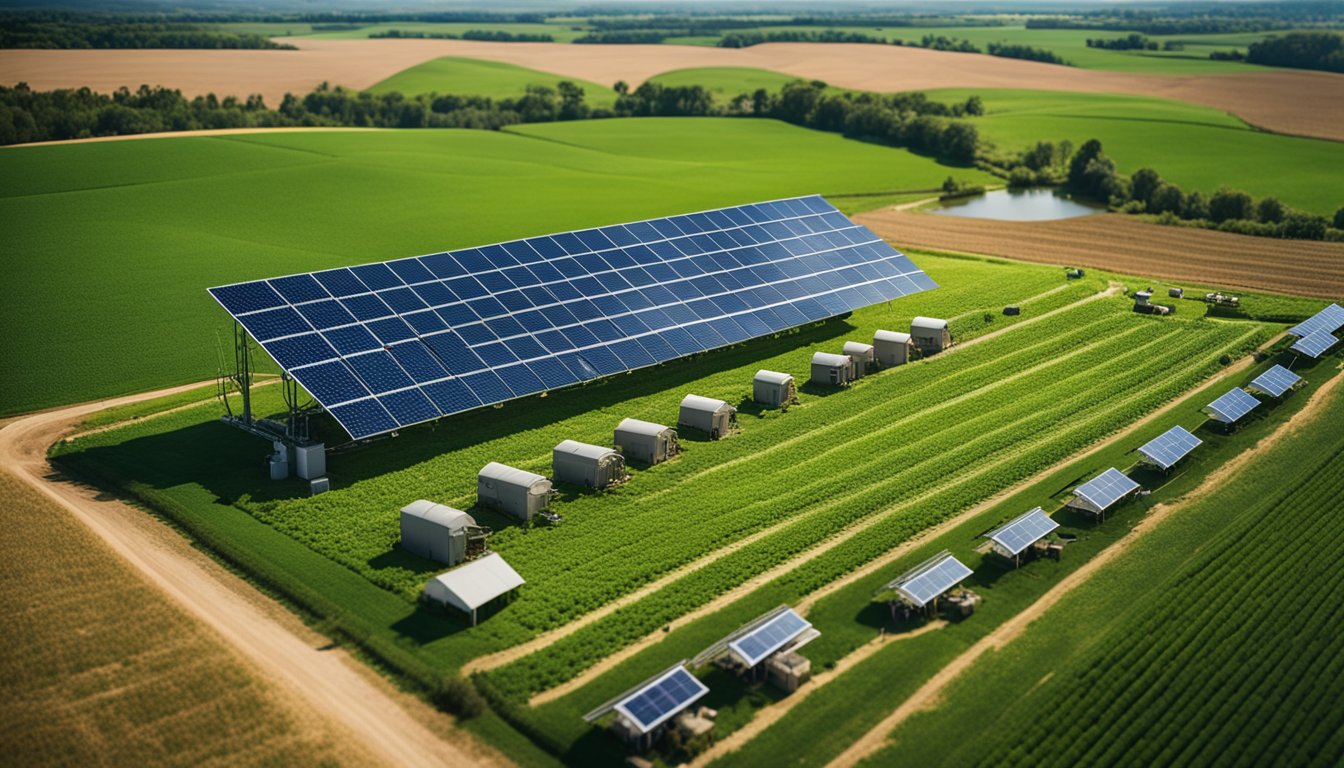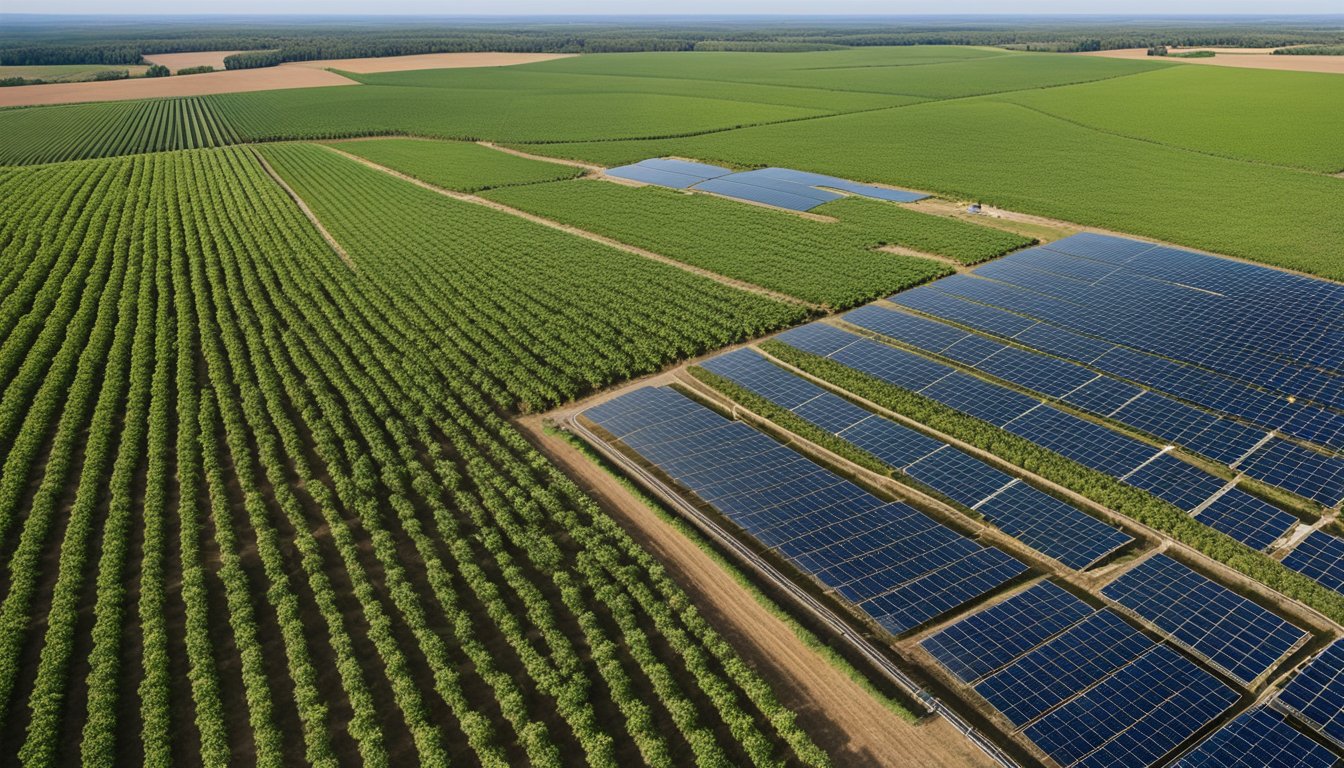Late updated: 03 Oct 2024 10:10
Written by: Oliver Bennett
Exploring Eco-Friendly Farming Innovations in the UK: Pioneering Sustainable Practices
The UK is at the forefront of eco-friendly farming innovations, exploring new ways to meet the challenges of food production while addressing environmental concerns. As we face pressing global issues like climate change and the need for increased biodiversity, our agricultural practices are evolving rapidly. Many farms are adopting sustainable agriculture models, which are crucial for enhancing productivity and food security.

The integration of cutting-edge techniques such as precision agriculture and regenerative farming is changing the landscape of how we grow and harvest crops. By focusing on improving soil health and addressing the impacts of agriculture on biodiversity, these practices not only boost farm profitability but also foster resilience against climate change. These innovations ensure that our methods remain economically viable and environmentally sustainable.
To further encourage these advancements, there are numerous initiatives and collaborations being launched in the UK. From government-supported programmes to private sector investments, we see a concerted effort to support this transformation. By adopting these transformative practices, businesses and farms can make significant strides in promoting eco-friendly agricultural practices that benefit both the environment and society.
Key Takeaways
- Eco-friendly farming innovations are crucial for sustainability.
- New practices boost productivity and address climate change.
- UK initiatives support the growth of sustainable agriculture.
Innovations in Sustainable Agricultural Practices

Sustainable agricultural techniques have become crucial for improving food security and productivity while maintaining ecological balance. By employing regenerative agriculture, enhancing crop health through strategic rotations, integrating livestock, and optimising pest management, we can foster an environmentally friendly agriculture system.
The Impact of Regenerative Agriculture on Soil Health and Productivity
Regenerative agriculture emphasises practices that restore and enhance soil health. By using techniques such as cover cropping, minimal soil disturbance, and organic amendments, we can significantly improve soil structure and fertility. This not only aids in carbon sequestration but also boosts water retention, leading to increased soil productivity. Implementing these regenerative practices helps ensure long-term sustainability and resilience in agricultural systems, contributing to better food security.
Advancing Crop Rotation and Health for Sustainable Farming
Crop rotation is essential for sustainable farming as it interrupts pest cycles, reduces pathogen build-up, and enhances soil fertility. By implementing diverse planting schedules, we can enhance crop health and yield. This practice not only improves nutrient availability but also reduces the need for chemical fertilisers. Such integrative approaches uphold soil productivity and support biodiversity, making farms more resilient to climate-related challenges.
Integrating Livestock in Eco-Friendly Farming Systems
Integrating livestock into farming systems supports animal welfare and sustainability. Through rotational grazing, livestock can improve soil fertility and structure by naturally fertilising the land. Livestock integration contributes to nutrient cycling, helping us utilise resources more efficiently. This symbiotic relationship between crops and animals fosters a balanced ecosystem, enhancing overall farm productivity and ecological health.
Optimising Pest Management Beyond Chemical Pesticides
Pest management in sustainable agriculture requires innovative approaches beyond conventional chemical pesticides. Embracing biological controls and habitat management, we can reduce dependency on chemicals. Techniques such as companion planting and employing natural predators play a crucial role in maintaining ecological balance. These methods support biodiversity while protecting crop health, resulting in a more sustainable approach to pest management.
Economic and Environmental Implications

As eco-friendly farming innovations continue to evolve in the UK, they bring both economic opportunities and environmental challenges. Focusing on reducing emissions, contributing to the bioeconomy, and aligning with European standards, these changes hold significant implications for the sector.
Reducing Greenhouse Gas Emissions in Agriculture
Reducing greenhouse gas emissions is crucial for sustainable agriculture. In the UK, practices such as crop rotation, agroforestry, and precision farming are being adopted to cut emissions.
By enhancing these methods, we can lower the sector's carbon footprint and move closer to national net-zero targets. Agroforestry combines agriculture with tree planting, reducing deforestation and increasing carbon sequestration. This integration aims to minimise environmental impact while promoting biodiversity.
Technology plays a pivotal role too. Drones and satellite imaging optimise resource use, ensuring inputs are applied precisely, thus limiting unnecessary emissions. These tech-driven solutions align with our climate action goals by providing models that are both sustainable and efficient.
Contributions to the Bioeconomy and Food Security
Eco-friendly innovations contribute substantially to the bioeconomy. By advancing biotechnology and organic farming, we foster a sustainable system that supports a circular economy.
The use of bio-based materials reduces reliance on fossil fuels. This shift also enhances food security, ensuring the availability of healthy diets while minimising environmental harm. Emphasising perennial crops and natural pest control, these practices improve soil health and crop resilience.
Embracing sustainable techniques offers economic advantages, encouraging new markets and reducing costs associated with traditional farming inputs. Collaboration between farmers and researchers drives these developments, enabling more resilient food systems.
UK Agriculture Sector Alignment with the European Union
Aligning the UK agriculture sector with European Union standards is a complex task. The post-Brexit landscape poses regulatory challenges, yet collaboration remains vital for sustainability. Our commitment to reducing biodiversity loss and adhering to environmental policies is key to this relationship.
We share goals of cutting emissions and enhancing sustainable farming practices. This alignment facilitates trade and shared research initiatives, benefiting both our economy and environment.
Working towards unified standards strengthens our agricultural methods, ensuring that they remain competitive and sustainable. Engaging with European networks, we leverage collective knowledge to drive forward eco-friendly innovations in agriculture.
Frequently Asked Questions
In this section, we address pressing questions about eco-friendly farming advancements in the UK. Our focus is on sustainable practices, support for farmers, the environmental benefits, energy integration, organic farming's role, and the challenges faced.
What initiatives are being adopted for sustainable agriculture in the UK?
Sustainable farming initiatives in the UK aim to enhance environmental health and resource efficiency. Practices include crop rotation, reduced pesticide use, and conservation efforts. Programmes by various organisations foster innovation and support practices like regenerative agriculture, which rejuvenates soil health and biodiversity.
How does the UK support farmers in transitioning towards more sustainable practices?
The UK government offers financial incentives and technical assistance to farmers embracing sustainable methods. Schemes under the Department for Environment, Food & Rural Affairs (Defra) provide grants to fund innovations and transitions, creating a supportive framework for sustainable farming endeavors.
What are the key benefits of eco-friendly farming methods for British ecosystems?
Eco-friendly farming methods support biodiversity and improve soil quality. They help preserve natural habitats and employ techniques that reduce emissions and water usage. By promoting healthier ecosystems, these practices contribute significantly to the resilience of the UK's natural environment.
In what ways are UK farmers integrating renewable energy sources into their practices?
Farmers in the UK are increasingly using renewable energy sources like solar and wind power. These technologies power farm operations, reducing reliance on fossil fuels. Additionally, anaerobic digesters are used to convert waste into biogas, further contributing to energy sustainability.
How does organic farming contribute to sustainability efforts in the UK agriculture sector?
Organic farming enhances sustainability by promoting soil health and reducing chemical use. It emphasises natural fertilisers and pest control measures. This form of farming supports local ecosystems and manages resources efficiently, aligning closely with broader sustainability goals.
What are the main challenges faced by UK farmers in adopting eco-friendly innovations?
Adopting eco-friendly practices in the UK comes with financial and logistical challenges. Farmers often face initial high costs, regulatory hurdles, and market pressures. Despite these challenges, ongoing support and policy developments are essential to facilitate smoother transitions in adopting sustainable innovations.
